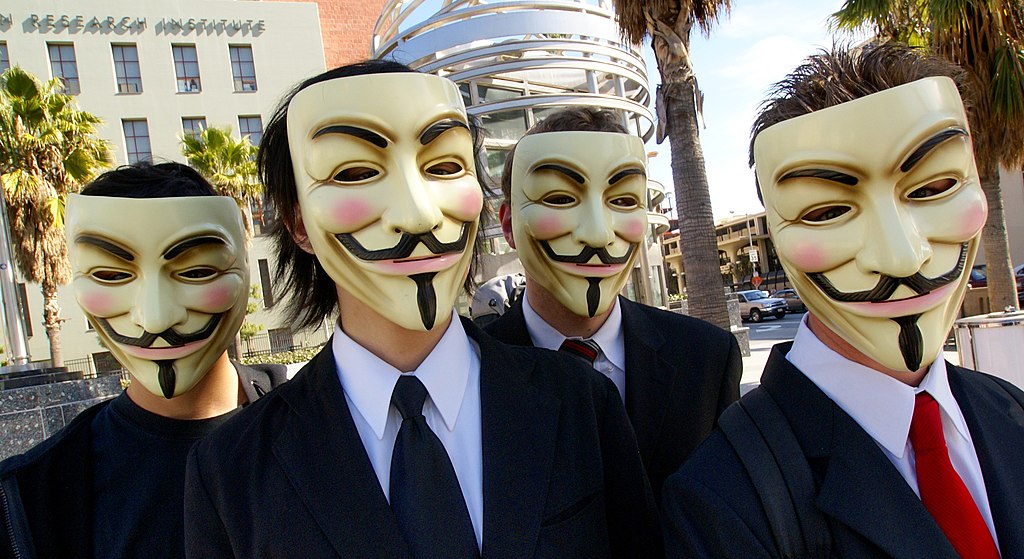British rock guitarist was a member of the Anonymous Hacking Group

Geoffrey “Jake” Commander, a rock guitarist who has played with the Electric Light Orchestra, George Harrison and Elton John, among others, walked unnoticed through the halls of the U.S. District Court in Alexandria early Friday afternoon.
Having been found indigent by a federal judge, the 66-year-old was accompanied by a court-appointed lawyer. Nearly four years to the day earlier, as his attorney put it, Commander, “like the crew of Gilligan’s Island, went on a three-hour tour that led to disastrous consequences.”
He was one of 13 people charged last year as members of the underground group Anonymous in attacks against financial institutions and other companies. Initially, he faced up to 10 years in federal prison.
Later, though, the case was quietly downgraded to a misdemeanor. On Friday, Commander was sentenced to 10 days in the Alexandria jail. With credit for one day served already after his arrest, he’ll be out early next week.
Records hardly depict Commander as a cybercrime mastermind as much as an online surfer who stumbled his way into an unfamiliar chat room. Once there, in what he later would call an “impulsive, spurious and foolish” decision, he clicked on a link that would lead him years later right into the crosshairs of the Justice Department.
Just about all of the other defendants in the case were in their 20s, but Commander, with shoulder-length gray hair and wearing a suit and tie during his brief court appearance, hardly seemed to fit the profile of an Anonymous hacker.
He still faced up to a year in jail when he appeared before U.S. District Judge Liam O’Grady, who couldn’t help but profess to Commander that he kept his car radio tuned to classic rock.
According to sentencing papers submitted to the court, Commander had a long career in rock music, and even set up a White House tour for ELO in 1978. He later became a writer and expert on computers, but work dried up in recent years.
The chain of events that put him in front of Judge O’Grady began Dec. 10, 2010. He was online at his home in New Hampshire when he entered an Anonymous chat room, seeing more than 1,000 others there too. From there, he clicked on an “LOIC” tool, which stands for “low orbit ion cannon.”
Essentially, it’s a stress test tool that can be used by hackers to fire off a huge amount of traffic to a target site, resulting in servers crashing in what’s known as a DDoS, or distributed denial of service attack.
Commander clicked on one of these links. He never tried to argue that he didn’t know that what he was doing was wrong. He said in court that he considered it a form of “protest.” He said he thought that banks had “brought the country to its knees.”
After clicking on the link, Commander’s computer targeted MasterCard’s website, which lost more than $1 million in the attacks by Commander and others. He quit after three hours.
Years passed, presumably with little thought of the incident. He and his wife and son had left their home in New Hampshire and moved back to England. But they came back to the U.S. last fall, where Commander was arrested, placed on pretrial release and had to surrender his British passport.
He’d been waiting for more than a year to be sentenced. His family moved back to England while he stayed in a tiny apartment in New Hampshire with a table, two chairs and an inflatable bed, according to defense papers.
Commander’s attorney, Drewry Hutcheson Jr., told the judge a few days before sentencing that unlike other defendants in the case, who were allowed to serve their jail time on weekends, Commander didn’t want that at all. He wanted to get it all over with at once.
He argued against probation too, saying it would just keep his client in the country living in a “hovel” for even longer, when all he wanted to do was to reunite with family in England. He also said Commander would promise to never return to the U.S. again.
Mr. Hutcheson didn’t make the argument during the brief sentencing hearing Friday, but in court papers he had said there were about 2,000 people who took part in the attacks. Taken together, the attacks spanned months and were known as “Operation Payback.”
“The undersigned wonders whether prosecuting 13 people out of two thousand participants in the Anonymous inspired DDoS attack provides that certainty of getting caught either,” he wrote in a memo.
The operation targeted, among other institutions, financial companies that refused to process donations to Wikileaks — the organization that published classified State Department cables from Bradley Manning, who was sentenced to 35 years in prison.
Prosecutors pointed out in their own sentencing memo that Commander faced a year in prison under sentencing guidelines, but said the Justice Department would defer to the judge in papers that never explicitly argued for a specific length of incarceration.
The prosecutors quoted Attorney General Eric H. Holder Jr. during an appearance before Congress as a top Justice Department official in 2000. He said such attacks “cause significant consequences, not only for victim companies, but also for consumers and the economy as a whole.”
In brief remarks to the judge, Mr. Commander apologized.
“I’m mortified to have upset the government of this country, which has been my host for many years,” he said.
Source: Billboard Biz / The Washington Times


